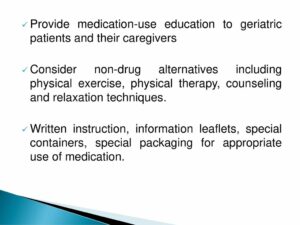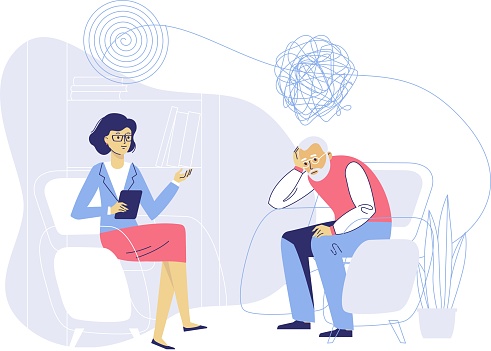As we live longer and healthier lives, the need for geriatric counseling services will continue to grow. In this blog post, we are going to explore geriatric counseling in depth. We will discuss what geriatric counseling is, what it is for, why you might consider it, and how to find a counselor if you feel this might be right for you or a loved one.
Contents
Understanding Geriatric Counseling

Geriatric counseling is a specialized form of counseling that focuses on the unique needs of older adults. It can help seniors cope with the physical, emotional, and social changes that come with aging.
Problems That Comes With Ageing
As we age, our bodies change and we may experience a range of physical health problems. These can include conditions like arthritis, heart disease, cancer, and dementia. We may also struggle with emotional issues such as loneliness, sadness, or anxiety. Our social lives may change too, as we lose friends and family to death or illness, or move away from loved ones. All of these factors can lead to feelings of isolation, depression, and anxiety.
Here Comes Geriatric Counselors
Geriatric counselors are trained to help seniors deal with the unique challenges that come with aging. They can provide support, guidance, and practical tools to help seniors cope with physical changes, manage chronic health conditions, deal with grief and loss, and stay socially connected.
Areas Geriatric Counselors Specialize In
There are many different types of geriatric counseling. Some common areas that counselors may specialize in include:
- Dealing with grief and loss
- Coping with a terminal illness or chronic condition
- Managing dementia or Alzheimer’s disease
- Handling retirement transitions
- Adjusting to changes in physical abilities
- Navigating the challenges of being a caregiver
- Coping with the death of a spouse or loved one
- Adjusting to living in a nursing home or long-term care facility
Issues That Geriatric Counseling Addresses
The physical and emotional changes that come with aging can be difficult to manage on your own. Geriatric counseling can provide seniors with the support they need to deal with these challenges. Counseling can help older adults:
- Manage grief and loss
- Make plans for the future
- Find new ways to connect with others
- Adjust to changes in their physical abilities
- Improve communication with family and friends
- Cope with feelings of sadness, loneliness, or anger
- Deal with the stress of a chronic illness or disability
Unfolding Geriatric Counseling
If you are considering attending geriatric counseling, there are a few things you should know.
- First, counseling is typically conducted in person. However, some counselors may offer online or phone counseling for those who cannot attend in person.
- Second, counseling sessions typically last 50-60 minutes.
- Third, sessions are typically scheduled once a week but can be more or less frequent depending on the needs of the older adult.
How It Works
The first step in geriatric counseling is an evaluation. This includes a review of your medical history, mental health history, and current situation. The counselor will also ask about your goals for counseling.
Counseling sessions typically last 50-60 minutes and are scheduled once a week. During these sessions, you will discuss the challenges of aging that you are facing and how to best address them. You will also work on goals with your counselor and create a plan to achieve them.
The number of counseling sessions will vary depending on the individual’s needs. Some people may only need a few sessions, while others may need ongoing counseling for an extended period.
NOTE: If you have any questions or concerns about geriatric counseling, be sure to discuss them with your counselor. They will be able to address any concerns you may have and help you decide if counseling is right for you.
How To Make Most of It
If you are attending geriatric counseling sessions, here are some things to keep in mind:
- Be open and honest with your therapist. Share your thoughts and feelings, even if they are negative or embarrassing.
- Take advantage of the resources your therapist provides. This may include books, articles, or websites related to aging.
- Follow through with the goals you set with your therapist.
- Make a note of any progress you make and celebrate any accomplishments.
How Much Does It Cost
The cost of geriatric counseling will vary depending on the location and type of services. In general, the cost ranges from $50 to $100 per session. Some counselors may offer a sliding scale based on income or offer discounted rates for multiple sessions.
Evaluating Geriatric Counseling

There are several factors to consider when deciding if geriatric counseling is right for you or a loved one. Some things to think about include:
- The severity of the issues being faced
- Willingness and ability of the person seeking help to participate in counseling
- Availability of family and friends who can provide support
- Location and cost of counseling services
- Ability to transportation to and from counseling sessions
Benefits Of Geriatric Counseling
Geriatric counseling can provide older adults with the support they need to cope with the challenges of aging. Counseling can help seniors:
- Feel more connected and supported
- Find new ways to connect with others
- Connect seniors with resources and experts
- Offer guidance for making plans for the future
- Improve communication with family and friends
- Cope with feelings of sadness, loneliness, or anger
- Deal with the stress of a chronic illness or disability
- Feel more prepared to deal with the changes of aging
Limitations of Geriatric Counseling
Despite the many benefits of geriatric counseling, there are also some limitations to consider. These include:
- The cost: Geriatric counseling can be expensive, especially if you do not have insurance.
- The availability: There may not be many counselors in your area that specialize in geriatric counseling.
- The time commitment: Counseling can take up a lot of time, which may not be feasible for some older adults.
Still Why Consider It
Geriatric counseling is not a cure-all for the challenges of aging. Counseling can help seniors cope with the challenges of aging. But it cannot prevent or reverse the process. It is important to keep this in mind when considering geriatric counseling.
Despite the limitations, there are many reasons why older adults and their families should consider geriatric counseling. Counseling can offer seniors support, guidance, and resources as they navigate the changes of aging. It can also help family members learn more about aging and how to best support their loved ones.
If you are a senior or have a loved one who is a senior, geriatric counseling can be a valuable resource. It can help seniors manage the challenges of aging and maintain their health and wellbeing. Counseling can also provide support for caregivers, who may need help coping with the stress of caregiving.
Finding a Geriatric Counselor

Geriatric counseling is provided by a variety of mental health professionals, including:
- Psychologists
- Pastoral counselors
- Mental health counselors
- Marriage and family therapists
- Licensed clinical social workers
How To Find One
If you are interested in finding a geriatric counselor, there are a few things you can do. For instance:
- Ask your doctor or other health care professionals for referrals.
- Check with your local Department of Aging or Area Agency on Aging to see if they have a list of recommended counselors in your area.
- Contact your insurance company to see if they have a list of providers who offer geriatric counseling services.
- Check with local universities or graduate schools to see if they have a counseling clinic that offers services to older adults.
You can contact potential counselors to ask about their experience and training working with older adults, as well as their fee structure. Then, schedule a meeting with the counselor to discuss your goals and see if you feel comfortable working with them.
What To Look Out For
If you are considering geriatric counseling, the first step is finding a counselor who is right for you. There are many factors to consider when choosing a counselor. For instance:
- First, be sure to find a counselor who has experience working with older adults.
- Second, choose a counselor who offers the type of counseling that you are looking for.
- Third, look into their fee structure and insurance coverage to stay afloat on counseling without worrying.
- Finally, be sure to find a counselor who is located near you and has availability that fits your schedule.
NOTE: Some counselors use a problem-solving approach. While others use a more holistic or humanistic approach.
Red Flag To Avoid
Some red flags to avoid when looking for a geriatric counselor. For instance:
- A lack of experience with older adults.
- Heavy focus on medication or medical treatments.
- Counseling is based on religious or spiritual beliefs.
- Fees that are too expensive or do not have insurance coverage.
What Else To Check Out
If you are interested in starting geriatric counseling, here are some things to check out for yourself:
- Call your insurance company to see if they cover the cost of counseling services.
- Check with your local Department of Aging or Area Agency on Aging to see if they have a list of counselors who offer reduced rates or sliding scales based on income.
Pursuing Training In Geriatric Counseling
If you are interested in pursuing training in geriatric counseling, there are a few things to keep in mind.
- First, most programs require that you have a master’s degree in counseling or a related field.
- Second, many programs offer internship or practicum opportunities that allow you to gain experience working with older adults.
- Third, most programs require that you pass a state-licensed exam to become a certified geriatric counselor.
Promoting Health of Older Adults

One of the main goals of geriatric counseling is to promote the health of older adults. Counseling can help seniors stay physically, emotionally, and mentally healthy as they age. In addition, counseling can also help seniors connect with their community and find support.
Furthermore, many things can be done to promote the health of older adults. However, some ways to do this include:
- Helping manage chronic conditions.
- Encouraging social and recreational activities.
- Promoting healthy eating habits and physical activity.
- Providing access to needed medical care and support services.
- Educating family members and caregivers about aging-related issues.
NOTE: Geriatric counseling is not just for seniors who are experiencing problems. It can also be helpful for seniors who are doing well. But want to maintain their health and wellbeing as they age. Counseling can provide tools and strategies for healthy aging, which can help seniors stay active and engaged in life.
Hearing From Experts
If you want to hear from experts on aging, there are a few ways to do this. However, you can:
- Read books or articles by experts on aging.
- Attend conferences or seminars related to aging.
- Watch documentaries or talk shows about aging.
- Check with your local Department of Aging or Area Agency on Aging to see if they offer programs or events related to aging.
Case Study
Here is an example of how geriatric counseling can help an older adult:
Mrs. Smith is a 72-year-old woman who lives alone. She has several chronic health conditions, including diabetes and high blood pressure. Mrs. Smith’s daughter lives out of state and is not able to provide much support.
Mrs. Smith began attending geriatric counseling sessions. During her sessions, she discussed her health conditions and the challenges she was facing. Mrs. Smith and her therapist also worked on goal setting and developing a plan to manage her chronic conditions.
After several months of counseling, Mrs. Smith’s health had improved and she felt more confident in her ability to manage her chronic conditions. Mrs. Smith’s therapist also connected her with resources in her community, which helped her stay active and engaged in life.
Resources
If you are interested in learning more about geriatric counseling, there are a few resources that you can refer to. For instance:
Books
- “The Psychology of Aging: A Comprehensive Guide”, by Dr. Mary Beth Spitznagel, clinical psychologist (specialized in geriatric counseling)
- “How We Age: Mind, Body, and Brain”, by Dr. Marc Agronin, a geriatric psychiatrist
Websites
- The American Psychological Association (APA): apa.org/helpcenter/geriatric-counseling.aspx
- The National Association of Social Workers (NASW): naswdc.org/ageducation/geriatric-counseling
- The American Counseling Association (ACA): counseling.org/resources/areas-of-expertise/gerontological-counseling
Conclusion
Geriatric counseling can be a valuable resource for older adults and their families. It can provide support and guidance as they navigate the challenges of aging. If you are considering geriatric counseling; be sure to do your research and find a counselor who is right for you. Furthermore, remember to ask questions. Moreover, be open with your therapist, and do celebrate any progress made.
A Word From Therapy Mantra
Your mental health — Your psychological, emotional, and social well-being — has an impact on every aspect of your life. Positive mental health essentially allows you to effectively deal with life’s everyday challenges.
At TherapyMantra, we have a team of therapists who provide affordable online therapy to assist you with issues such as depression, anxiety, stress, workplace Issues, addiction, relationship, OCD, LGBTQ, and PTSD. You can book a free therapy or download our free Android or iOS app.


